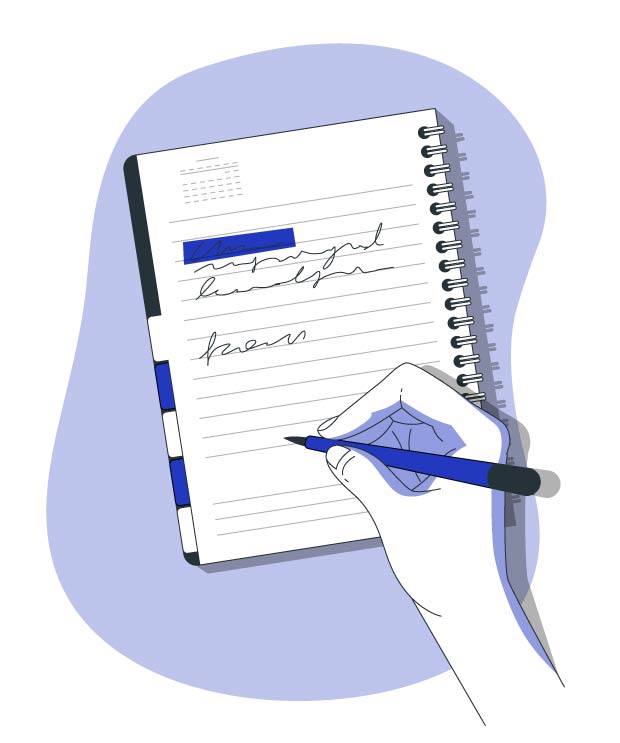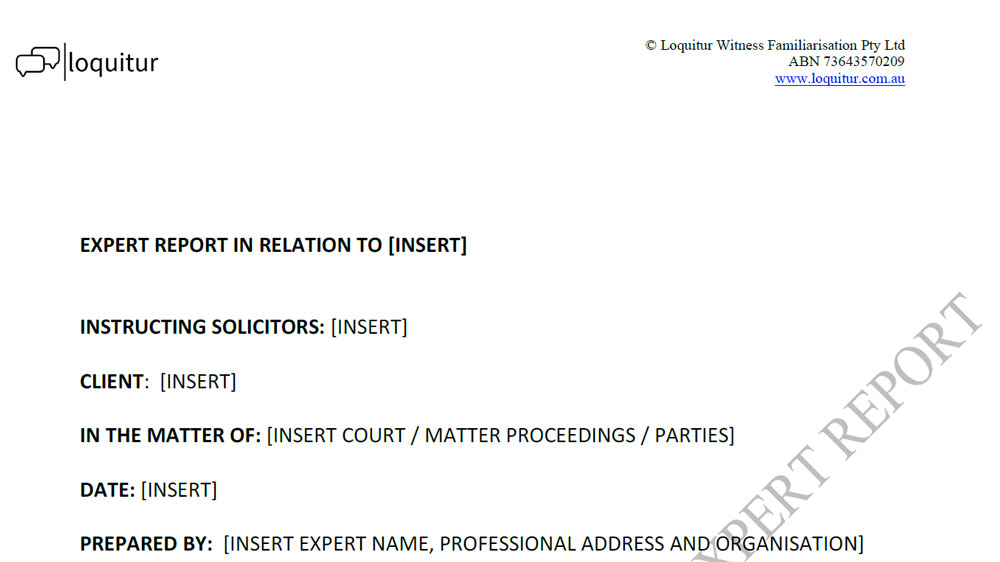Free Expert Witness Report Template
To assist experts in preparing their reports, we offer a free expert witness report template, available in both PDF and Word formats.
Use it as a template or guide to enhance your drafting and documentation. Just enter your first name and email to download it immediately and elevate the quality of your expert reports.


The structure of an expert witness report is a particularly important consideration in the drafting of any report. However, there is rarely “one size fits all” type of report.
There will be various differences depending on factors such as:
1. The jurisdiction (be it a State Court or Federal Court, Arbitration, or international proceedings).
2. The level/seniority of the court.
3. The type of proceedings – civil, criminal, family law etc.
4. The relevant expert rules, code of conduct and requirements applicable to that report.
While in all circumstances, the substantive content of the report will differ, there are some common themes and considerations all experts should note when structuring their report. These can include:
1. The use of headings,
2. The use of numbered paragraphs,
3. Page numbering,
4. Annexures, and
5. Summaries and conclusion where appropriate.
To assist experts worldwide in their drafting of their expert reports, we have provided the following sample, precedent expert report completely free of charge. The report is available in both “pdf” and editable “Word” format. Please feel free to use this as a template or guide when preparing and drafting your expert reports.

Subscribe to our newsletter
Sign up here to get the latest news, updates and tips about witness preparation directly to your inbox.

This report is provided simply as an example or a guide to help you plan and structure your report in a logical way. It is not the only way to prepare a report and it also may not be the most appropriate format for your report. This will depend on many factors, such as:
1. The court in which the report will be used,
2. Whether you are a joint expert or not;
3. The substantive content of your report;
4. The relevant code of conduct and court rules applicable in the proceedings.
If you have any specific questions in respect to the drafting of the substantive content of your report, we recommend you speak to your instructing solicitor. Also remember that in providing this report we have not (and indeed cannot) consider the specific legal situation you are in. This report should in no way be considered as legal advice – it is provided for general training and educational purposes only.
Nonetheless, please feel free to download this report as a sample or example template for any further reports which you may draft.
Expert Witness Cross Examination Training CPD
If of interest Loquitur is pleased to provide a free Expert Witness Cross Examination Training and Ethics CPD Video to all expert witnesses.

Benefits of using our expert witness report template
- Ensures all reports adhere to a high standard of professionalism, reflecting well on the expert witness and legal team.
- Achieves uniformity across all reports, making them easier to review and understand.
- Saves valuable time by providing a pre-structured format, allowing focus on content rather than formatting.
- Includes all necessary sections and prompts, ensuring no critical information is omitted.
- Easily adaptable to specific cases while maintaining overall integrity and format.
- Minimises the risk of errors and omissions, contributing to more accurate and reliable reports.
- Enhances readability, making it easier for courts to digest the information presented.
- Aligns with legal and professional standards, ensuring reports meet industry expectations.
- Simplifies quality control processes, ensuring all reports meet the highest standards before submission.
- Enhances the credibility and persuasiveness of the expert witness, strengthening the overall case presentation.
Expert witness template: Tips and discussion
We discuss Loquitur’s free expert witness report template (Word and PDF) precedent document. We discuss the report structure and content and provide drafting tips and suggestions for all experts when drafting their reports more generally.
The example of an expert witness report, and this structuring and drafting tips video, are for Australian based expert witnesses across all Australian jurisdictions, but will still be very beneficial to all expert witnesses, especially those in other common law jurisdictions.
Get your expert witness report example (PDF and Word)
If you would like further information on how to draft expert reports, we recommend reviewing our “Top Tips” for expert report drafting.
Flexible, self-paced online options are also available.
How to Write an Expert Witness Report: 10 Tips
What makes one expert report better than that of an opposing expert? How can I make my expert
report withstand the scrutiny of the court? What is the optimal structure for an expert witness’ report? How to write an expert witness report in general?
These are all very valid questions, and questions likely to be asked by any expert in preparing an expert report.


An expert report is very different from any other report a professional will write. It is not a peer-reviewed article, or an internal or external technical report. It is aimed at a very different audience (some might say an unusual or awkward audience) – lawyers. The report will be pored over by judges, barristers, solicitors and other experts, both in court, and in preparation for court as they try and discredit, analyse and forensically dissect and critique the report.
It also serves a very different purpose – it is not to express a finding or set of results. It is to educate the Court on a very specific and niche topic, which the court very likely knows very little about. It is to provide the expert’s opinion evidence on that topic, and to go no further.
Furthermore, reports will differ depending on the jurisdiction of the proceedings for which the report is made. For example, an expert report in a commercial matter the New South Wales High Court will be very different from one in a family law matter in the Family Federal Court in Victoria. Additionally, the various states and territories throughout Australia all have different rules which experts are bound by, as do the various arbitration tribunals.
Unsurprisingly, then it is very difficult to write a report as an expert witness. It is a skill developed through many years of practise and specialised training, and in some cases, trial and error.
However, there are several key tips all expert witnesses can use when preparing their reports to make them as robust and useful to a Court as possible. If you follow these suggestions you will be best placed to provide a comprehensive, well-reasoned report which will be invaluable to the court’s understanding of the relevant issues, and which will in turn stand you in a much better position for any cross examination on the report.

1. State your assumptions
All expert reports rely on various assumptions. Typically these are provided as part of your letter of instructions from instructing solicitors. Explicitly note these assumptions in your report.
2. Remember everything you write down is potentially discoverable
It is possible that everything you write down in respect of your expert report may have to be disclosed to the other side. Everything! It is not necessarily protected by privilege. This includes handwritten notes, drafts and emails. Thus be very careful before you write anything down.
3. Structure your report logically
Lawyers love structure. It makes a document easier to read, and easier to refer to specific parts therein. Use short paragraphs, headings, numbered paragraphs, annexures and page numbers.
4. Attach a relevant CV
This one is pretty obvious, but it is worth mentioning. You need to include a CV as this will establish your credibility and utility as an expert. However, make sure that CV is specific to the instruction at hand. Note relevant prior work history, and remove irrelevant information. Be sure to note prior engagements as an expert witness.
5. Explain your conclusions
Reasoning is the key to any expert report. A report by the most qualified expert is virtually useless to a court if it doesn’t explain the expert’s reasoning. Indeed, it is often the reasoning of a report which is more valuable to a court than the conclusions themselves.
Access your free editable sample expert report
6. Note the relevant rules etc
Each court and jurisdiction will have its own requirements, rules and/or code of conduct with which experts must comply. Be sure to reference this in your report so that the report in turn complies with the relevant rules. Typically your instructing solicitors will note these in their letter of instruction.
7. Don’t use jargon
Technical jargon should be avoided where possible. If unavoidable (such as when dealing with highlight technical matters) be sure to use as infrequently as possible, and to clearly define and explain the specific terms. Include a definitions section if necessary.
8. Only seek instructions from your instructing solicitors
Only your instructing solicitors can provide the expert witness instruction. There are significant legal and ethical problems with “informal” instruction arrangements and these will seriously affect your credibility as an expert. In fact, as a general rule, an expert should not approach the instructing party unless necessary for the report. Further, when this is required, the contact should be made through solicitors.
9. Keep the report short and concise
Courts will not be impressed by long rambling documents. They will not enhance your credibility – they will weaken it, and will likely open you up to more areas on which the report can be critiqued and on which you can be cross examined. Keep the report as short and concise as possible.
10. Consider the reasonableness of your instructions and assumptions
As an expert you are independent. You are required to exercise a degree of critical assessment of your instructions and assumptions. You must think about these, and the effect on your conclusions if they are found to be incorrect or false. A failure to do so may affect your credibility as an independent expert. Discuss any issues or concerns with your instructing solicitors, and be prepared to answer further questions on these as part of any joint report or cross examination.

There is no perfect expert report, and there is no “one size fits all” form of expert report. However, with sufficient work, skill and analysis an expert can prepare a report which can better withstand the rigours of opposing experts, joint reports, conclaves and cross examination. Follow these simple steps and you will be in a much better position when drafting the report.
Combine this with courtroom experience, expert witness training, and knowledge and understanding, and you as an expert will be of great utility and benefit to the court and instructing solicitors in all future expert engagements.
To learn more about our expert witness training for report writing and cross examination click here.
Please contact us if you have any questions or so see how we can potentially assist you with your expert report for court writing.
FAQs
What is an expert witness report?
An expert witness report is a document prepared by a qualified expert, providing a professional opinion on matters within their expertise to assist the court in understanding technical aspects of a case.
How to write an expert witness report?
Writing an expert witness report involves clearly presenting your qualifications, stating your expert opinion, and providing a detailed analysis of the reasons and evidence. Our template offers a structured format to ensure accuracy and professionalism.
How is expert evidence provided in writing?
Expert evidence is provided to courts etc in a written statement or report provided by that expert witness. It details their findings, opinions, and the basis for those opinions, to be used as evidence in legal proceedings.
How can I use this example of an expert witness report?
What is the expert witness report outline?
An expert witness report outline includes an introduction, background information, methodology, findings, opinion, and conclusion. Using our template ensures all necessary sections are covered in a logical and coherent manner.
What formats is the expert witness report template available in?
The expert witness report template is available in both PDF and editable Word formats, providing flexibility for your specific needs.
Are there any limitations to using this expert witness report sample?
Is the expert witness report template truly free?
Can I share the template with colleagues?
What is the expert witness report format?
The expert witness report format typically includes sections such as the expert’s qualifications, summary of opinions, methodology, analysis, and conclusion. Our template follows this standard format to ensure completeness and clarity.

